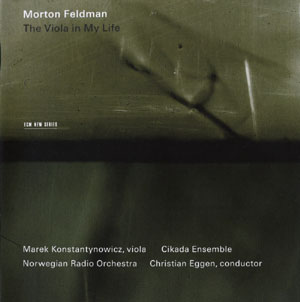 I remarked once upon a time that Morton Feldman’s music fills space. Listening to the sections of The Viola In My Life, I realize that Feldman does rather more than fill space: he shapes it, gives it duration and form, brings a dimensionality into music that is all too rare (one thinks of Bach, perhaps Alban Berg, maybe John Luther Adams, but vanishingly few others who bring that kinesthetic sensibility into the realm of sound).
I remarked once upon a time that Morton Feldman’s music fills space. Listening to the sections of The Viola In My Life, I realize that Feldman does rather more than fill space: he shapes it, gives it duration and form, brings a dimensionality into music that is all too rare (one thinks of Bach, perhaps Alban Berg, maybe John Luther Adams, but vanishingly few others who bring that kinesthetic sensibility into the realm of sound).
And he does it with silence. Paul Griffiths, in his essay accompanying this recording, says “There is a sort of quietness we experience when nothing is happening, but there is another quietness when something – something enormous – has just happened.” That is precisely the feeling one gets when listening to “Viola In My Life I”: aftermath, in a way, a definition of an event of some magnitude. A realization, perhaps, that something is different. Pauses, while we adjust to a new reality, anchored by a lyrical astringency as the viola makes its presence felt, but softly, exploring the bounds of its territory, defining the silences that shape the space of this work, as the silences define the sounds that fill it.
It’s a thread that carries through the other parts, silence and sound juxtaposed in combinations that somehow bypass our defenses and lead our thoughts into places that can’t quite be described. It requires not patience so much as a willingness to forget what we know and just follow where the music leads, to be quiet for a while and dispense with everyday things, to let go and be seduced.
The forces gathered to perform this work do it full justice. The Cikada Ensemble provides a backdrop for the first three sections that fulfills our expectations for twentieth-century music, with touches of color that sometimes delight, sometimes surprise, while the Norwegian Radio Orchestra under Christian Eggen places an understated but substantial backdrop to Marek Konstantynowicz on the viola that makes the few, brief crescendos terrifically imposing. Konstantynowicz brings not only intelligence but passion to the work, an intensity that plays a key part in the seduction.
I have to confess that this one surprised me. I enjoy Feldman’s music, and I think, in the canon of the mid- and late twentieth century, he’s written some challenging but ultimately accessible works that reveal a highly refined, and very tough, aesthetic, such that, while the intellectual underpinnings of his work are undeniably there, they become secondary to the act of listening. The Viola In My Life, however, did more than engage me: it pulled me right out of myself and into a place I didn’t know existed.
(ECM New Series, 2008)
